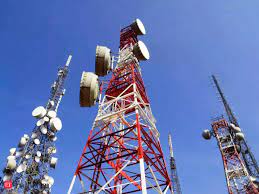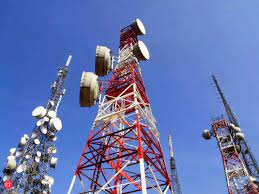
The departure of telecom equipment manufacturers Nokia and Ericsson from Russia at the end of the year may gradually impair the nation's mobile networks over time, worsening communication for regular Russians.
Russian mobile phone users will probably experience slower downloads and uploads, more dropped calls, calls that won't connect, and longer outages as operators struggle over depleting spare parts inventories and lose the ability to upgrade or patch software, according to five senior telecom executives and other industry sources.
Everything from telecom antennas to the hardware that connects optical fiber carrying digital signals is produced by Ericsson and Nokia, which together control a significant portion of the telecom equipment market and close to 50% in terms of base stations in Russia.
They also offer essential software that enables the network's various components to communicate with one another.
"We are working towards the end of the year and that's when all exemptions (from sanctions) expire," Ericsson's finance chief Carl Mellander told Reuters. Ericsson received exemptions to sanctions from Swedish authorities.
Nokia CEO Pekka Lundmark echoed that sentiment in a interview: "Our exit will be complete. We are not going to deliver anything to Russia."
The impending withdrawal of Nokia and Ericsson could have a more profound effect on Russian daily life, eventually making something as simple as a phone call difficult. To date, Russia's economy has withstood the sanctions and export controls instituted by governments after Moscow sent tens of thousands of troops into Ukraine.
Requests for comment from the Russian Ministry of Digital were not answered, but this week Maksut Shadaev, Minister of Communications and Mass Media, claimed that four telecom operators were signing agreements to purchase Russian-made equipment for more than 100 billion roubles ($1.45 billion).
"This will allow us to organise modern production of telecoms equipment in Russia," he said, without naming the operators or producers.
MTS, the largest telecom provider in Russia, declined to comment on this story. Requests for comment from Megafon, Veon's Beeline, and Tele 2, the other companies that make up Russia's Big Four telecoms firms, went unanswered.
Over the past few years, government initiatives to promote Russian equipment have helped telecom operators reduce their reliance on Nokia and Ericsson, and this year, Russian producers increased their market share from 11.6% in 2021 to 25.2%.
But as the rest of the world moves forward with the deployment of 5G technologies, industry sources predict that the breaking of ties to foreign firms will set back Russian communications by a generation.
"If, presumably, this situation lasts for years, Russian cellular networks in terms of coverage may return to the state of the late 1990s, when their coverage was limited to large cities and the richest suburbs," said Leonid Konik, who runs the IT publication ComNews in Moscow.
According to telecom experts, operators will begin removing equipment from rural areas to support urban networks, which will cause rural areas to experience network failures and cyberattack exposure first.
According to sources with direct knowledge of the situation, Chinese telecom equipment manufacturer Huawei, which accounted for more than a third of the market share in Russia last year, has ceased selling new equipment there. However, it will continue to offer software updates and perform maintenance.
The lack of patches and software upgrades—Nokia and Ericsson announced they would stop providing software updates by next year—will be the biggest challenge for mobile operators to maintain their networks, according to the sources.
Software converts analog and digital signals, monitors and optimizes network traffic, and defends infrastructure against cyberattacks. It also unifies a variety of devices that make up a telecom network.
Mobile operators are dependent on a regular schedule of licensed software updates and patches to maintain the integrity of a network, even though they can stockpile hardware components for later use.
"Unquestionably, software patches are paramount to ensure networks remain operational, safe secure and reliable," said Paolo Pescatore, an analyst at PP Foresight.
According to two industry sources, Russian telecom operators stocked up on foreign-made components in February and March in anticipation of sanctions; however, inventory will decline once Nokia and Ericsson cease operations on December 31.
Industry sources added that consolidation among Russian operators at the government's request might also enable them to share resources and equipment to extend the life of the networks.
According to three sources with knowledge of the situation, Huawei has also stopped selling its smartphones in Russia, where it had previously stopped selling new equipment after the United States imposed sanctions on the nation. Huawei has remained silent about its position in Russia and has declined to comment.
(Source:www.reuters.com)
Russian mobile phone users will probably experience slower downloads and uploads, more dropped calls, calls that won't connect, and longer outages as operators struggle over depleting spare parts inventories and lose the ability to upgrade or patch software, according to five senior telecom executives and other industry sources.
Everything from telecom antennas to the hardware that connects optical fiber carrying digital signals is produced by Ericsson and Nokia, which together control a significant portion of the telecom equipment market and close to 50% in terms of base stations in Russia.
They also offer essential software that enables the network's various components to communicate with one another.
"We are working towards the end of the year and that's when all exemptions (from sanctions) expire," Ericsson's finance chief Carl Mellander told Reuters. Ericsson received exemptions to sanctions from Swedish authorities.
Nokia CEO Pekka Lundmark echoed that sentiment in a interview: "Our exit will be complete. We are not going to deliver anything to Russia."
The impending withdrawal of Nokia and Ericsson could have a more profound effect on Russian daily life, eventually making something as simple as a phone call difficult. To date, Russia's economy has withstood the sanctions and export controls instituted by governments after Moscow sent tens of thousands of troops into Ukraine.
Requests for comment from the Russian Ministry of Digital were not answered, but this week Maksut Shadaev, Minister of Communications and Mass Media, claimed that four telecom operators were signing agreements to purchase Russian-made equipment for more than 100 billion roubles ($1.45 billion).
"This will allow us to organise modern production of telecoms equipment in Russia," he said, without naming the operators or producers.
MTS, the largest telecom provider in Russia, declined to comment on this story. Requests for comment from Megafon, Veon's Beeline, and Tele 2, the other companies that make up Russia's Big Four telecoms firms, went unanswered.
Over the past few years, government initiatives to promote Russian equipment have helped telecom operators reduce their reliance on Nokia and Ericsson, and this year, Russian producers increased their market share from 11.6% in 2021 to 25.2%.
But as the rest of the world moves forward with the deployment of 5G technologies, industry sources predict that the breaking of ties to foreign firms will set back Russian communications by a generation.
"If, presumably, this situation lasts for years, Russian cellular networks in terms of coverage may return to the state of the late 1990s, when their coverage was limited to large cities and the richest suburbs," said Leonid Konik, who runs the IT publication ComNews in Moscow.
According to telecom experts, operators will begin removing equipment from rural areas to support urban networks, which will cause rural areas to experience network failures and cyberattack exposure first.
According to sources with direct knowledge of the situation, Chinese telecom equipment manufacturer Huawei, which accounted for more than a third of the market share in Russia last year, has ceased selling new equipment there. However, it will continue to offer software updates and perform maintenance.
The lack of patches and software upgrades—Nokia and Ericsson announced they would stop providing software updates by next year—will be the biggest challenge for mobile operators to maintain their networks, according to the sources.
Software converts analog and digital signals, monitors and optimizes network traffic, and defends infrastructure against cyberattacks. It also unifies a variety of devices that make up a telecom network.
Mobile operators are dependent on a regular schedule of licensed software updates and patches to maintain the integrity of a network, even though they can stockpile hardware components for later use.
"Unquestionably, software patches are paramount to ensure networks remain operational, safe secure and reliable," said Paolo Pescatore, an analyst at PP Foresight.
According to two industry sources, Russian telecom operators stocked up on foreign-made components in February and March in anticipation of sanctions; however, inventory will decline once Nokia and Ericsson cease operations on December 31.
Industry sources added that consolidation among Russian operators at the government's request might also enable them to share resources and equipment to extend the life of the networks.
According to three sources with knowledge of the situation, Huawei has also stopped selling its smartphones in Russia, where it had previously stopped selling new equipment after the United States imposed sanctions on the nation. Huawei has remained silent about its position in Russia and has declined to comment.
(Source:www.reuters.com)





